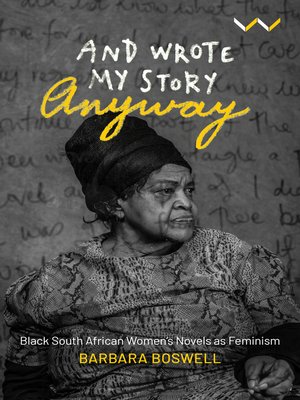
Sign up to save your library
With an OverDrive account, you can save your favorite libraries for at-a-glance information about availability. Find out more about OverDrive accounts.
Find this title in Libby, the library reading app by OverDrive.



Search for a digital library with this title
Title found at these libraries:
| Library Name | Distance |
|---|---|
| Loading... |
Part literary history, part feminist historiography And Wrote My Story Anyway: Black South African Women's Novels as Feminism critically examines influential novels in English by eminent black female writers. Studying these writers' key engagements with nationalism, race and gender during apartheid and the transition to democracy, Barbara Boswell traces the ways in which black women's fiction critically interrogates narrow ideas of nationalism. She examines who is included and excluded, while producing alternative visions for a more just South African society. This is an erudite analysis of ten well-known South African writers, spanning the apartheid and post-apartheid era: Miriam Tlali, Lauretta Ngcobo, Farida Karodia, Agnes Sam, Sindiwe Magona, Zoë Wicomb, Rayda Jacobs, Yvette Christiansë, Kagiso Lesego Molope and Zukiswa Wanner. Boswell argues that black women's fiction could and should be read as a subversive site of knowledge production in a setting, which, for centuries, denied black women's voices and intellects. Reading their fiction as theory, for the first time these writers' works are placed in sustained conversation with each other, producing an arc of feminist criticism that speaks forcefully back to the abuse of a racist, white-dominated, patriarchal power.|Part literary history, part feminist historiography And Wrote My Story Anyway: Black South African Women's Novels as Feminism critically examines influential novels by eminent black female writers. Studying these writers' key engagements with nationalism, race and gender during apartheid and the transition to democracy, Barbara Boswell traces the ways in which black women's fiction interrogates narrow ideas of nationalism. She examines who is included and excluded, while producing alternative visions for a more just South African society. This is an erudite analysis of ten well-known South African writers, spanning the apartheid and post-apartheid era: Miriam Tlali, Lauretta Ngcobo, Farida Karodia, Agnes Sam, Sindiwe Magona, Zoë Wicomb, Rayda Jacobs, Yvette Christiansë, Kagiso Lesego Molope and Zukiswa Wanner. Boswell argues that black women's fiction could and should be read as a subversive site of knowledge production. Reading their fiction as theory, these writers' works are placed in sustained conversation with each other, producing an arc of feminist criticism that speaks forcefully back to the abuse of a racist, white-dominated, patriarchal power.







